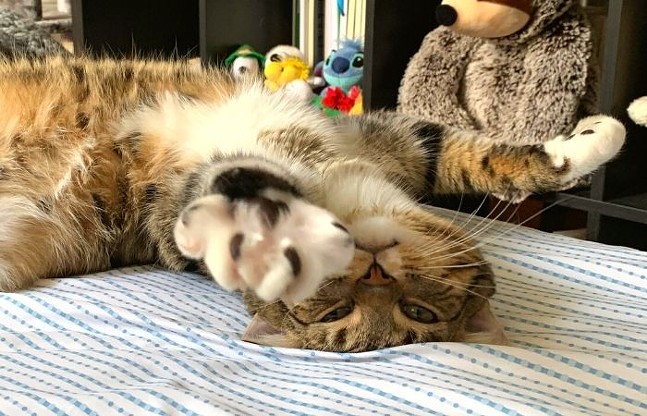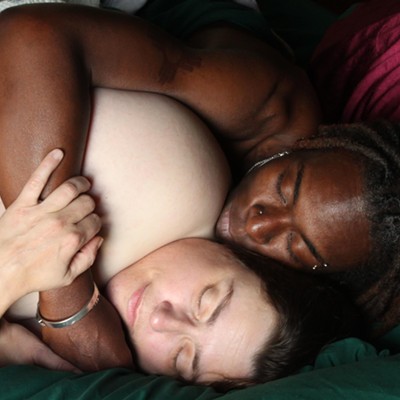UPDATE: Pittsburgh City Council votes unanimously to prohibit declawing cats in the City of Pittsburgh
Update — 3 p.m. Tue., Sept. 28
Pittsburgh City Council voted unanimously Tue., Sept. 28, in favor of City Councilor Bobby Wilson’s bill to prohibit the declawing of cats within the city. The vote comes a week after a Sept. 22 Standing Committee meeting, during which animal care groups, veterinarians, and others spoke about the harms and dangers of declawing. The Standing Committee affirmatively recommended the legislation.
Original story published Sept. 22
Anyone who’s cuddled with a cat knows how capricious they can be. Harmless toe beans one moment, claws out the next. While cats’ claws can hurt, declawing causes pain and other behavioral and health issues for cats, and a new piece of legislation could ban the act in the city of Pittsburgh.
Pittsburgh City Councilor Bobby Wilson (D-North Side) introduced Bill 1877 at the Sept. 14, City Council meeting, where it was read and referred to the Committee on Public Safety Services. The bill, if passed, will amend Title Six, Article III, Chapter 633 of Pittsburgh's code, which deals more broadly with dogs and cats, to prohibit the declawing of cats. The act would be punishable with a fine of up to $500 for each violation.
“The city of Pittsburgh should set an example as a humane city, both in Southwest Pennsylvania and across the Commonwealth of Pennsylvania,” said Wilson in a press release. “How we treat animals speaks to our deepest values.”
The bill, which is co-sponsored by Councilors Bruce Kraus (D-South Side) and Anthony Coghill (D-Beechview), presents several reasons why declawing cats is both inhumane and potentially dangerous for cats and the people who coexist with them.
“Declawing a cat does not just mean removing its nails. Instead, it means amputating the last bone on each of the cat’s toes. If this happened to a human, it would be like cutting off each finger and toe at the last knuckle,” Wilson said. “This is a cruel and inhumane procedure that will cause our cats a lifetime of pain and discomfort.”
The bill also points to behavioral problems for cats who have been declawed, such as increased biting and litter box-aversion, as well as the dangers for declawed outdoor cats since they are no longer able to adequately defend themselves.
If behavioral problems lead people to abandon their cats, the bill notes that it would exhaust the resources of the local shelter system, Animal Care & Control, community cat rescue, and return to field programs. The bill also states that declawed cats tend to be less adoptable due to behavioral issues, which can lead to euthanization and in turn cause compassion fatigue for shelter workers.
Major health authorities who have advised against declawing cats to protect humans, such as the Centers for Disease Control and Prevention, National Institutes of Health, the U.S. Public Health Services, and the Infectious Diseases Society of America, are cited in the bill. The American Veterinary Medical Association, the Humane Society Veterinary Medical Association, and the American Association of Feline Practitioners also oppose declawing cats as an elective procedure.
Prohibiting declawing also has precedent in the New York state, the St. Louis County in Missouri, as well as many U.S. cities, including Austin, Denver, San Francisco, and Los Angeles. Countries in Europe, South America, and Oceania have also prohibited declawing cats. More locally, all veterinary hospitals operated by Mars Veterinary Health no longer offer elective declawing.
The bill offers alternatives to declawing for cat owners who are worried about cats scratching furniture, other property, and owners. Regular nail trimming, scratching posts, deterrent pheromone spray, covering furniture, and using plastic nail covers are all alternatives that do not require the severing of cats’ bones, nerves, joint capsules, and collateral ligaments. These alternatives also allow cats to maintain means of movement and defense, as well as normal posture and use of toes.
“We can do better,” said Wilson. “My bill puts the City of Pittsburgh on a path to treating our cats humanely.”
Pittsburgh City Council voted unanimously Tue., Sept. 28, in favor of City Councilor Bobby Wilson’s bill to prohibit the declawing of cats within the city. The vote comes a week after a Sept. 22 Standing Committee meeting, during which animal care groups, veterinarians, and others spoke about the harms and dangers of declawing. The Standing Committee affirmatively recommended the legislation.
Original story published Sept. 22
Anyone who’s cuddled with a cat knows how capricious they can be. Harmless toe beans one moment, claws out the next. While cats’ claws can hurt, declawing causes pain and other behavioral and health issues for cats, and a new piece of legislation could ban the act in the city of Pittsburgh.
Pittsburgh City Councilor Bobby Wilson (D-North Side) introduced Bill 1877 at the Sept. 14, City Council meeting, where it was read and referred to the Committee on Public Safety Services. The bill, if passed, will amend Title Six, Article III, Chapter 633 of Pittsburgh's code, which deals more broadly with dogs and cats, to prohibit the declawing of cats. The act would be punishable with a fine of up to $500 for each violation.
“The city of Pittsburgh should set an example as a humane city, both in Southwest Pennsylvania and across the Commonwealth of Pennsylvania,” said Wilson in a press release. “How we treat animals speaks to our deepest values.”
The bill, which is co-sponsored by Councilors Bruce Kraus (D-South Side) and Anthony Coghill (D-Beechview), presents several reasons why declawing cats is both inhumane and potentially dangerous for cats and the people who coexist with them.
“Declawing a cat does not just mean removing its nails. Instead, it means amputating the last bone on each of the cat’s toes. If this happened to a human, it would be like cutting off each finger and toe at the last knuckle,” Wilson said. “This is a cruel and inhumane procedure that will cause our cats a lifetime of pain and discomfort.”
The bill also points to behavioral problems for cats who have been declawed, such as increased biting and litter box-aversion, as well as the dangers for declawed outdoor cats since they are no longer able to adequately defend themselves.
If behavioral problems lead people to abandon their cats, the bill notes that it would exhaust the resources of the local shelter system, Animal Care & Control, community cat rescue, and return to field programs. The bill also states that declawed cats tend to be less adoptable due to behavioral issues, which can lead to euthanization and in turn cause compassion fatigue for shelter workers.
Major health authorities who have advised against declawing cats to protect humans, such as the Centers for Disease Control and Prevention, National Institutes of Health, the U.S. Public Health Services, and the Infectious Diseases Society of America, are cited in the bill. The American Veterinary Medical Association, the Humane Society Veterinary Medical Association, and the American Association of Feline Practitioners also oppose declawing cats as an elective procedure.
Prohibiting declawing also has precedent in the New York state, the St. Louis County in Missouri, as well as many U.S. cities, including Austin, Denver, San Francisco, and Los Angeles. Countries in Europe, South America, and Oceania have also prohibited declawing cats. More locally, all veterinary hospitals operated by Mars Veterinary Health no longer offer elective declawing.
The bill offers alternatives to declawing for cat owners who are worried about cats scratching furniture, other property, and owners. Regular nail trimming, scratching posts, deterrent pheromone spray, covering furniture, and using plastic nail covers are all alternatives that do not require the severing of cats’ bones, nerves, joint capsules, and collateral ligaments. These alternatives also allow cats to maintain means of movement and defense, as well as normal posture and use of toes.
“We can do better,” said Wilson. “My bill puts the City of Pittsburgh on a path to treating our cats humanely.”



















